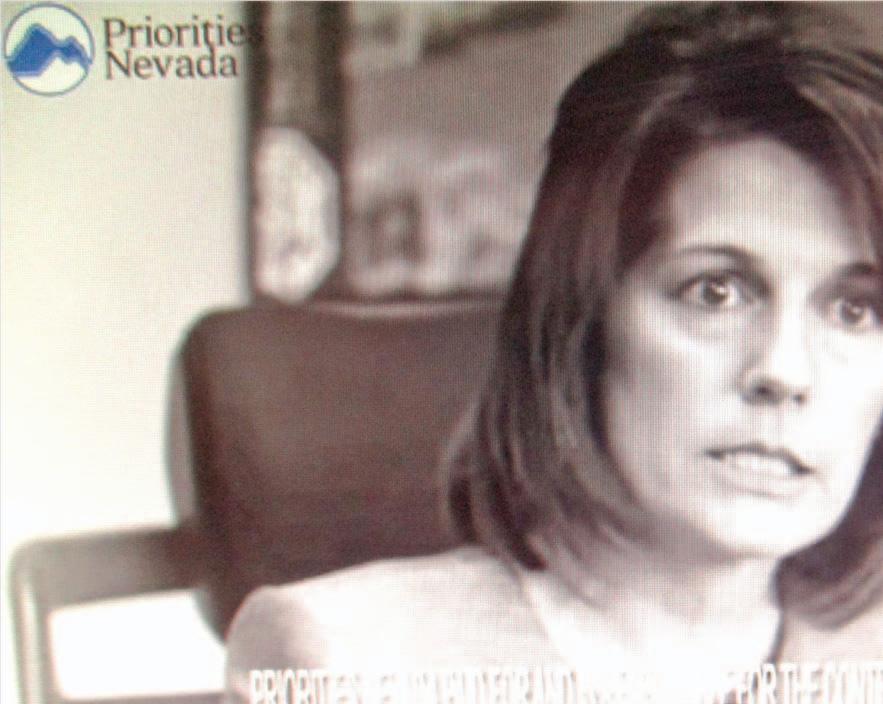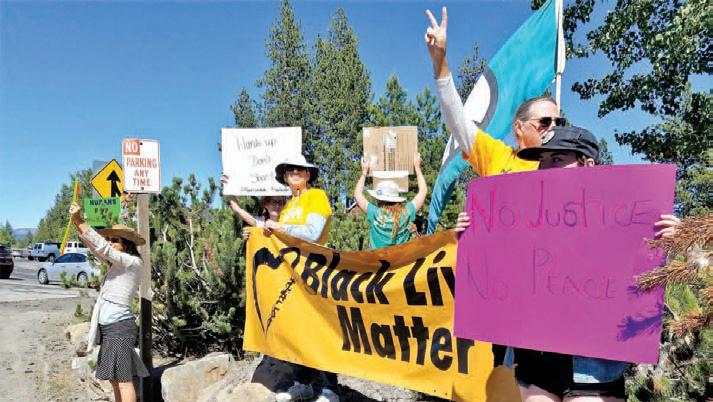
8 minute read
News
from July 14, 2016
Latest straws in the wind
A Monmouth University survey shows Hillary Clinton leading Donald Trump 45 to 41 percent in Nevada, with Libertarian Gary Johnson holding five percent.
Advertisement
Analyst Nate Silver wrote on July 12, “With its rapidly growing Latino and nonwhite populations, Nevada has demographics that increasingly look like California’s.” Last year, Nevada analyst Fred Lokken said, “Based on the 2010 census, this is pretty much a blue state,” though he limited that to presidential races.
A Pew Research Center survey shows the gender gap, with Donald Trump doing all he can to offend women, has widened to a whopping 24 percentage points. In most places, that is an aid to Clinton. But Nevada is one of two states with a majority of men.

nV energy powerLess

Two major Las Vegas resorts have informed the state they are dropping Nevada Power—an arm of NV Energy—as their power supplier.
Wynn Resorts and MGM Resorts will have to pay for the privilege—$86.9 million in MGM’s case and a bargain $15.7 million for Wynn.
“After careful thought and analysis over many months, we have concluded our objectives are best met by purchasing the energy required to operate our resorts, and serve our customers and guests, from a source other than NV Energy,” said an MGM letter to the Nevada Public Utilities Commission, which approved the exits in December.
The casinos will seek suppliers on the open market. MGM will break away on Oct. 1. Wynn has not yet named a date.
The Las Vegas Sands had also announced such plans but has not completed filings and objects to the size of exit fees. The PUC has said the fees “are necessary because NV Energy’s remaining ratepayers would otherwise be forced to pay increased rates to allow recovery of costs already incurred to provide reliable electric service to the casinos.”
To exit, the casinos are using a law that was enacted to deal with shortages during the early 21st century deregulation crisis, which was not repealed after that crisis passed.
pot taLe of the week
In the July 6 edition of the Las Vegas Review-Journal, Douglas County lawyer Jim Hartman wrote, “With marijuana’s new high potency levels—it’s up to seven times more potent than it was in the 1970s—about one in six marijuana users who starts as a teenager becomes physically dependent.”
According to a study of 38,600 samples of illegal marijuana seized by the U.S. Drug Enforcement Administration over a period of 20 years, the level of tetrahydrocannabinol—marijuana’s main psychoactive ingredient—rose from about 4 percent in 1995 to about 12 percent in 2014. The study was published Jan. 19 in the journal Biological Psychiatry.
However, potency is a so-what issue, since if marijuana is more potent, users smoke less. One likely reason for reduced use is that, according to the Bush administration’s 2005 “National Drug Threat Assessment,” higher potency marijuana is not marketable because it makes tokers sick—“more intense—and often unpleasant—effects of the drug leading them to seek medical intervention.”
To put it another way, for prohibitionists, higher potency is a good thing.
—Dennis Myers
The money race
Political dollars pour into Nevada
democratic U.s. senate nominee Catherine Cortez Masto is facing more than one opponent. She faces Republican Joe Heck. But she also faces Secure America Now, which raised more than $3 million for its efforts in the 2014 election. It is running ads against Cortez Masto.
And she faces the Koch brothers, whose Freedom Partners Action Fund is accusing her in its ads of enforcing the law as attorney general against unlicensed Uber drivers and vehicles in Nevada. This cost the state jobs, the Kochs say. They live back east.
Secure America Now is spending $46,693.11 to attack Cortez Masto. The Koch ad buy is $1.2 million.
Of course, Cortez Masto also has groups on her side running ads against Heck. But the spending disparity is normally pretty wide between Democratic and Republican groups. “Even among PACs [political action committees]—the favored means of delivering funds by labor unions—business has a more than 3-to-1 fundraising advantage. In soft money, the ratio is nearly 17-to-1,” according to the Center for Responsive Politics.
During this political season, according to CRP, business is responsible for 74.2 percent of all contributions, labor for 2.9 percent. Cortez Masto would normally be lucky to win.
But business is not putting all its money behind the Republicans this year. It is a 55 to 45 split, with the Democrats getting the 45. That’s not great for them, but it has been worse in some years. Given that business likes to go with the winners, it suggests that businesspeople are doubtful about Republican prospects this year.
The labor split is more lopsided—83 percent to the Democrats, 17 to the Republicans. But even if labor gave all its 2.3 percent to the Democrats, it wouldn’t address the imbalance.
Democrats are doing better with groups that CRP calls “ideological.” These are groups like the Koch PAC and Secure America Now. And for once, the Democrats are ahead in this category. Of the $136,267,574 raised so far by these groups, Democratic groups have received $48,947,275 with Republican groups receiving $38,942,607.
As a result, the League of Conservation Voters will spend almost $1.4 million to support Cortez Masto in this campaign. (The League supported Hillary Clinton over Bernie Sanders in the presidential race.)
According to the League’s Seth Stein, the $1.4 million will not be spent on broadcast or online ads: “The money is spent on an on-the-ground persuasion canvass effort—in other words, hiring staff to knock on doors and speak with voters about why Cortez Masto is a better choice for Nevadans. This campaign will run through Election Day.”
As a member of the U.S. House, Heck has received a score of eight percent from the League. In the past his ranking has been as high as 13 percent, in 2013, and as low as six percent, in 2015 and 2014. League national campaigns director Clay Schroers issued a prepared statement reading in part, “Heck is dangerously out of touch with Nevada’s families, who can’t afford to be represented by someone who rejects the conclusions of 97 percent of climate scientists, wants to block the Clean Power Plan, and consistently fights clean air and water protections.”
In a prepared statement, Heck spokesperson Brian Baluta said, “As the father of three, of course Dr. Heck cares about the future of our natural environment, which is why he
Candidates do not always see flattering photos of themselves when they are the subject of attack ads. This one, using an image of Catherine Cortez Masto, was put together by the right wing group Priorities Nevada and ran in January.
PHOTO/DENNIS MYERS
co-sponsored legislation supporting renewable energy development in Nevada.
However, Heck’s acceptance of Koch money tends to play into the story line Cortez Masto and the League are selling. The two billionaires are number 13 on the Political Economy Research Institute’s list of Toxic 100 Air Polluters. The Kochs also fund climate change denial groups. All this kind of national money trafficking, of course, is happening in Nevada’s U.S. House races as well, and in ballot measure campaigns, particularly Question 1, providing for gun purchase background checks, and Question 2, providing for marijuana regulation.
Political analyst Fred Lokken said corporate money can hurt a candidate if her opponent knows how to use the issue. It can nullify the advantage that money provides.
He said it’s not surprising that Democrats are getting more corporate money.
“It’s been 15 years in the making,” he said, arguing that Bill Clinton took a lot of
corporate money, and “it did not hurt him in his election bids. So Democrats are doing it all over.” Lokken said the public is generally not aware of how much money comes into their states, and even when they hear about it, they don’t seem to object. “I resent it, and I talk about it, and nobody seems bothered by it,” he said. “They are certainly unaware of how much money is coming from outside the state of Nevada. They don’t even realize that a number of their ballot initiatives are brought in from out of state.” He said people or organizations from out of state get ballot measures on the Nevada ballot by paying for signature gatherers, and the public likely assumes those people with clipboards are local volunteers. Two years ago, Nevada received a dramatic demonstration of the power of LOKKEN outside money. In a heavily Democratic U.S. House district, Democrat Steven Horsford was coasting to victory against bumbling, gaffe-prone Republican Cresent Hardy when a Karl Rove PAC suddenly dumped three quarters of a million dollars into the race a few days before the election, the money going to broadcast ads attacking Horsford, who never knew what hit him. This time, Hardy has the power of incumbency and a healthy campaign fund, and the Democrats had a primary in which they used up a lot of money. Ω
Heads up

A dozen people rallied in Tahoe City last weekend, calling attention to Black Lives Matter. The event was organized by Nicole Lutkemuller, who thought it was important to draw attention to the issue in a setting where the populace is overwhelmingly white. “Everyone is too complacent in Tahoe because we live in a little bubble of paradise where everyone loves everyone and everything is beautiful,” she wrote in a call for participants.











